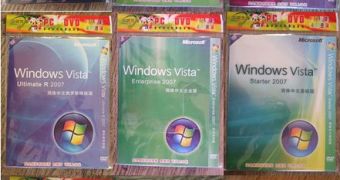Microsoft has poured a lot of efforts into reducing the piracy phenomenon affecting the Windows platform. But as it appears, the measures set in place by the Redmond company do by no means bode well with end users. Back in 2005, a firm step was taken to tone down the volume of pirated Windows copies in use with the introduction of the Windows Genuine Advantage platform. Cori Hartje, director of the Microsoft Genuine Software Initiative, revealed on the program's one-year anniversary that the WGA processed in excess of 600 million unique product validations. WGA is available for both Windows XP and Windows Vista, and is essentially a mechanism delivering a client side component which installs on the operating system, evaluates the platform's legitimacy and then communicates the result to the Microsoft online servers.
This basic functionality is what got the company slapped with a privacy infringement lawsuit in China. According to Xinhua, a Beijing university student has debuted legal action against Microsoft for violation of privacy in relation to the personal data harvested and transmitted from his machine. Peking University student Lu Feng, explained that the lawsuit was catalyzed by the discovery that the WGA failed to limit itself to validate his copy of Windows XP, but also communicated a report to Microsoft with his personal information. Feng is now demanding Microsoft to erase all data related to him, publish an official apology in a national newspaper, but in addition the student also wants the court to order the annulment of the WGA installation agreement and the company to be forced to deliver a tool to uninstall the anti-piracy mechanism.
Microsoft is transparent when it comes to the information that the WGA is collecting, including: "computer make and model; version information for the operating system and software using Genuine Advantage; region and language setting; a unique number assigned to your computer by the tools (Globally Unique Identifier or GUID); Product Key (hashed) and Product ID; BIOS name, revision number, and revision date and hard drive volume serial number (hashed)." Microsoft also receives a report if the WGA installed successfully, or if it failed to deploy, or if the user refused to run the tool, in addition to the validation check. "We have only just received the filing, and have not had the opportunity to review it and therefore cannot comment on the specifics of the allegations," a representative from Microsoft China stated. "What we can say is that Microsoft is fully committed to letting customers control their personal information."

 14 DAY TRIAL //
14 DAY TRIAL //